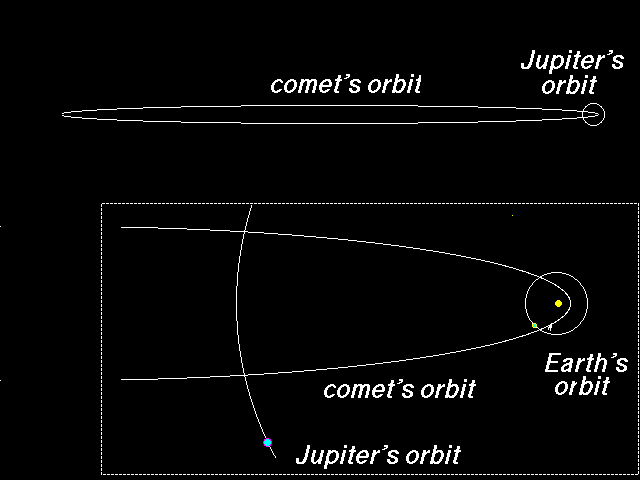Conservation of energy
Energy is an important concept in science (physics, biology,
..., and certainly in astronomy). The same word is used in everyday
speaking and writing, but in a less precise sense than the word is
used in science.
What is energy?
- There are many kinds of energy.
- Kinetic energy ((1/2) m v2) of a moving macroscopic body.
- Gravitational potential energy.
- Energy carried by light.
- Thermal energy (eg. the kinetic energy of the random motions of
the molecules.)
- ...more.
- Energy can move from place to place. (eg. in sunlight.)
- Energy can change from one kind to another.
- But for an isolated system -- a system that doesn't exchange any energy
with the oustide world -- the total amount of energy in the system
is constant.
Examples
- In a pendulum, energy is continually exchanged between gravitational
potential energy and kinetic energy.
- When a comet is far from the Sun it has lots of gravitational potential
energy but almost no kinetic energy.

As it approaches the Sun, its gravitational potential energy decreases
and its kinetic energy increases.
- When you drive a car, you turn chemical energy (related to the
arrangement of atoms in molecules) into kinetic energy of your car.
- The Bonneville Power Administration turns gravitational potential
energy of water behind dams into electrical energy, which is transmitted
to your house
- You can turn on a lamp and turn this energy into energy
of light plus thermal energy.
- The light energy gets converted to thermal energy when the light
is absorbed by the walls of the room.
We say that energy is conserved. Note that energy conservation
is a fact of nature, confirmed by experiment. We also speak of "energy
conservation" as a societal goal, but this means not letting too much
energy get transformed from a useful form (like electrical energy) to
a useless form (like making the whole Earth a little warmer).
Davison E. Soper, Institute of Theoretical Science,
University of Oregon, Eugene OR 97403 USA
soper@bovine.uoregon.edu

